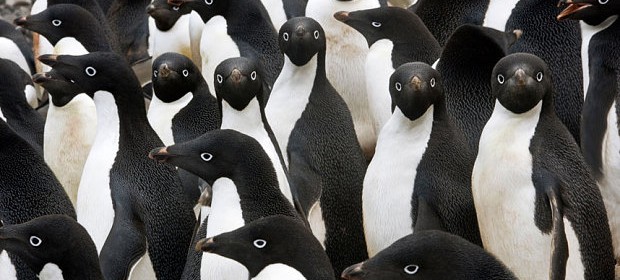Giant iceberg in Antarctica kills off 150,000 penguins

An enormous iceberg in Antarctica has killed off 150,000 penguins and threatens to wipe out an entire colony, which has become trapped and unable to reach food.
A study by researchers from New Zealand and Australia said only about 10,000 Adélie penguins have survived after an iceberg – labelled B09B – grounded in a bay in 2010. The grounding, at Commonwealth Bay, has forced the penguins to make a 70-mile round trip to feed in the sea.
“The arrival of iceberg B09B in Commonwealth Bay, East Antarctica, and subsequent fast ice expansion has dramatically increased the distance Adélie penguins breeding at Cape Denison must travel in search of food,” said the researchers in an article in Antarctic Science.
“The Cape Denison population could be extirpated within 20 years unless B09B relocates or the now perennial fast ice within the bay breaks out”
“This has provided a natural experiment to investigate the impact of iceberg stranding events and sea ice expansion along the East Antarctic coast.”
The researchers warned that the entire colony could be lost within 20 years if the iceberg does not break up or move. A colony just five miles away has survived and is “thriving”.
“The Cape Denison population could be extirpated within 20 years unless B09B relocates or the now perennial fast ice within the bay breaks out,” the article says.
“Our results have important implications for wider East Antarctic if the current increasing sea ice trend continues.”
The iceberg is about 60 miles long and 1,120 square miles in size – larger than Luxembourg. It had apparently been floating around the coast for 20 years before crashing into a glacier and becoming stuck.
Penguin numbers have been recorded for more than a century at Cape Denison, following an expedition by Australian explorer Sir Douglas Mawson, whose team members apparently complained about the noise from the colony.
“We saw lots of dead birds on the ground … it’s just heartbreaking to see”
Professor Chris Turney, from the University of New South Wales
“It’s eerily silent now,” says Professor Chris Turney, from the University of New South Wales.
“The ones that we saw at Cape Denison were incredibly docile, lethargic, almost unaware of your existence. The ones that are surviving are clearly struggling. They can barely survive themselves, let alone hatch the next generation. We saw lots of dead birds on the ground … it’s just heartbreaking to see.
“They’re stuck there. They’re dying.”
Source: The Telegraph

 Print
Print